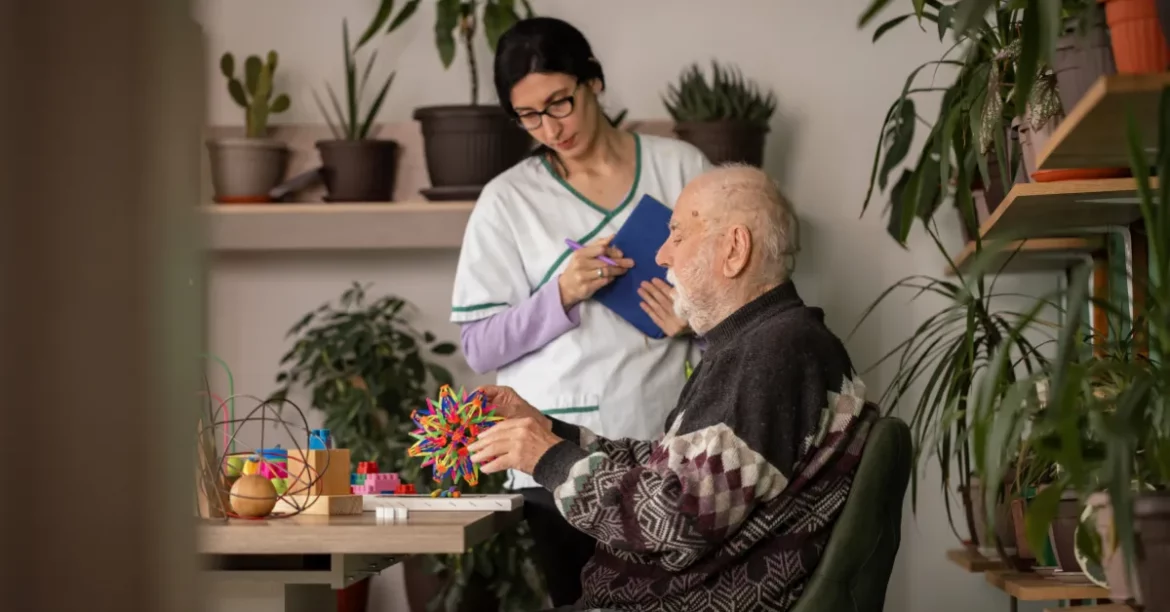Article Contents
It’s no secret that there is no outright cure for dementia, but we can manage the symptoms. Laughter is the best medicine, so fun and engaging activities can be the next best thing. Medicine can only take you so far in curing an illness, so when it comes to recovery or alleviating symptoms such as Alzheimer’s for elderly patients, something more is needed.
Doctors recommend various activities for seniors with dementia as they stimulate their senses and help them nurture their remaining cognitive skills. In this article, discover an array of activities, from arts and crafts to online gaming, and you will be able to find free, printable activities for your loved ones to enjoy! Without further ado, let’s get started!
Why is it important to keep dementia patients engaged in daily activities?
Before we move on to the best activities for dementia patients, let us understand how they are helpful. Regardless of whether someone is diagnosed with dementia, daily activities add quality and value to a person’s life and give them a sense of routine and purpose. Furthermore, they help with cognition and self-sufficiency and give them something to look forward to when they become a part of their routine.
Pros and cons of doing activities for a loved one with dementia
When dealing or living with a patient with dementia, someone who is dearer to you, the best part about it is the interaction; out of the many, there are free printable activities for dementia patients that can help create an interactive bond between the two. In addition, if there is someone with early signs of dementia, then these activities help develop the brain, making it less likely to develop severe stages of dementia.
But adaptability is one of the crucial challenges when dealing with a loved one suffering from dementia. Patience is an important trait as a caregiver, especially if you wish to avoid caregiver burnout. In addition, improvisation is important, too—the ability to assess a situation and make quick decisions based on the patient’s symptoms or behavior.
Things to remember when planning activities for dementia patients
Working with dementia patients can be a compassionate issue and must be handled with care. Listed below are the essential things to remember before planning such activities
Make a safe working environment
Dementia patients can be forgetful or not always function in a standard capacity. This could lead to accidental mishaps in unfamiliar environments. So before planning any activity, it is best to ensure a safe environment that should evoke calm in a patient.
Enjoyment over achievement
The purpose is to enjoy, not achieve. Design plans that can hold down the patient’s attention. There are many free dementia activity packs available for engaging sessions.
Ensure the patients are comfortable
Flexibility is vital when planning activities because it must be based on the patient’s mood. First, ensure they are comfortable; if not, introduce some other activity to keep the patients engaged.
Always avoid over-stimulation
When dealing with dementia patients, avoid places with crowds, fast movement, or excessive noise, as they can trigger the senses to go into overload.
Be patient
There may be situations when the patient is not responding to a certain activity. So being patient enough to find a replacement can go a long way.
How to choose the most appropriate activities for a loved one with dementia?
Firstly, it depends on how deep the connection is with the person. If you know about their life and what they like or dislike, it is easy to plan activities.
See what they love
Everyone has an emotional attachment. Chances are, if you know what your loved one was attached to, you can use it to create appropriate activities to help deal with dementia.
Find their comfort zone
Everyone has a preference, whether they have dementia or not. For example, some may like painting, while others listen to music. Try different activities to see which one your patient is comfortable with.
Free printed activities
They are free and appropriate for any dementia patient. For example, occupational therapy free printable activities for dementia patients help with engagement and attentiveness. Explore the article more to find some free printed activities!
You may find these articles interesting to read:
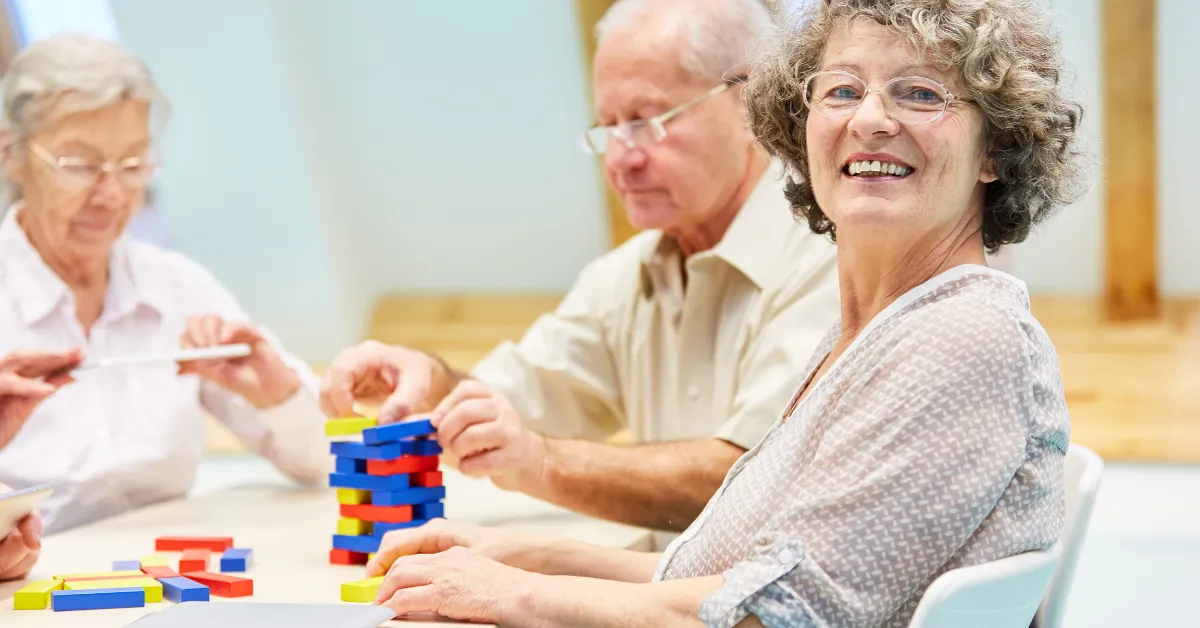
15 of meaningful activities for dementia patients
In 2020, over 55 million people were living with dementia. Currently, in the world, someone develops Alzheimer’s every 3 seconds, and this number will double every 20 years.
Memories are meant to be cherished, and even if dementia patients have trouble remembering, it does not mean that all is lost. Whether your older adult is in memory care or someone you have to take care of at home, you can create meaningful moments with the activities listed below:
1. Physical activities
Yoga, Tai Chi, or even group walks can be the best activity for dementia patients. Anything that involves physical movement without becoming too much of a strain is good for the mind and body.
2. Create a scrapbook
Photographs are always the best portal into nostalgia. Not only can they touch upon essential memories, but they can also help engage them in a conversation.
3. Start cooking
Cooking is the best way to stimulate all the senses in your body. With our easy recipes, the step-by-step cooking process is engaging enough for the dementia process, even if they need a little helping hand for support.
4. Make pasta threading
Pick up a needle and a pasta, and let your patient start threading. It serves as a good pastime and motor function for the body.
5. Animal therapy
Who does not love animals? Petting animals can stimulate the senses in your patient’s body, as the bonds between a person and animal are like muscle memory.
6. Working in the garden
For some fresh air and sensory stimulation, garden work is highly preferable. Gardening also helps in social interaction and makes the patients feel valued.
7. Dancing
Not only does dancing serve as a physical activity, but it is joyful as long as the patients are shuffling too hard.
8. Movie night
Watching their favorite movies is a form of reminiscence therapy for seniors with dementia. It helps them feel relaxed in their surroundings. This activity is also quite popular for older adults in assisted living.
9. Make a memory box
Memory boxes are like scrapbooks but for everything meaningful, not just photos. They contain precious items from a patient’s life that can help create a sense of connection.
10. Singing-a-long
Singing activities like karaoke are great group engagement sessions. Not only are the patients exercising their vocal range, but as it happens, singing to music can stimulate the brain.
Give this article a read:
11. Play games
There are plenty of fun and safe games to keep dementia patients engaged. Games like UNO, Dominoes, and Scrabble help improve the cognitive functions of dementia patients.
12. Puzzles
Working on puzzles not only stimulates the brain but helps in social interaction between caregiver and patient.
13. Reading
Reading can greatly help with memory and even reduce deterioration. There are helpful books on dementia that make for a great read. This activity is great for adults to do independently, especially if they require more assistance with daily activities
14. Share jokes
Telling jokes around the group helps reduce anxiety and depression in patients. What it does even better is bring a smile. Nothing can beat the power of humor!
15. Feel the texture
Feeling the soft texture, similar to a pet’s fur, is a soothing experience for dementia patients. It also aids in sensory stimulation, which brings about a nostalgic feeling often repressed by the condition.
3 Art activities for seniors with dementia
One of the best ways to express oneself is through art; for dementia patients, this is no different. Sometimes, these seniors can express unset thoughts and create mementos for themselves and their loved ones. While we have a variety of craft activities for seniors recommended in another blog, here are three art activities that we recommend for dementia patients:
Painting
It is a fun and simple exercise for older adults to express their creativity on paper. Seniors can either do finger painting if they have limited dexterity or work with watercolors and spend the time with great joy.
DIY photo frame
Give your senior a wooden frame with his or her favorite picture in it. Next, provide an assortment of objects such as paper flowers, sequins, lace, stickers, and glue. Now, step back and let your older adult work their magic, decorating the photo frame.
Make your movie poster
This can be a follow-up activity to watching a movie. After showing a fan favorite movie to your seniors, provide them with photos of the characters, other scenic elements, glue, and markers to decorate their interpretation of the movie onto poster paper. This helps nurture your seniors’ comprehension skills, keeping them engaged.
3 Free printable activities for dementia patients
Your senior might be a pen-and-paper person, and while you’re on the hunt for unique activities, this section is a good find. We have three printable activities that can keep your patient occupied and well-entertained for free, such as:
1. Easy Crossword puzzle
A crossword puzzle is a good brain teaser and is a popular activity for dementia patients. The clues here are quite easy to work with. Just in case, we have all the answers written in the corner for you to refer back to if your senior needs help.
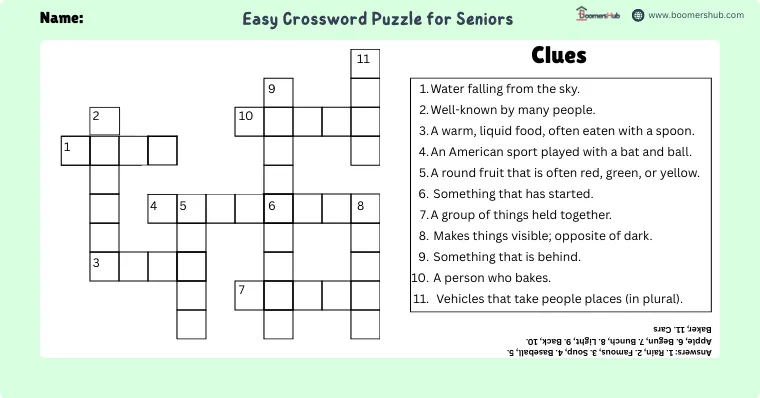
2. Fun coloring page for seniors
If you’re looking for a quick activity to keep your seniors occupied, consider this fun coloring page. It features three kinds of scenery, keeping your older adults curious and focused on finding the various colors needed to bring each scene to life.
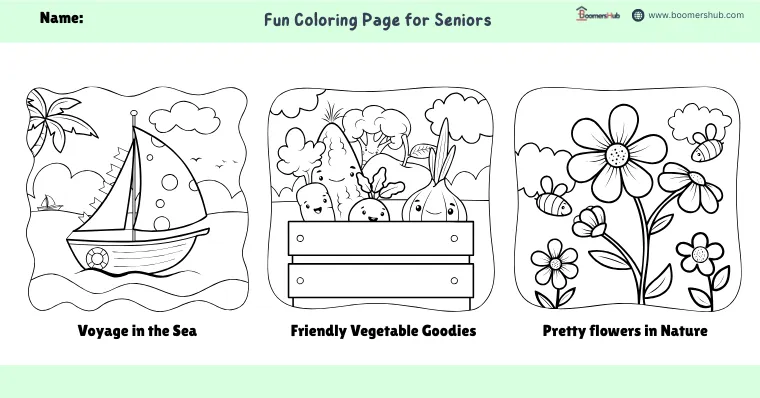
3. Help Molly get home through the maze
Your senior might crave something more challenging. Let your older adult help “Molly” get home by tracing the best path through the maze. Bonus: Encourage your senior to draw out a path, from start to finish, that collects all three candies!
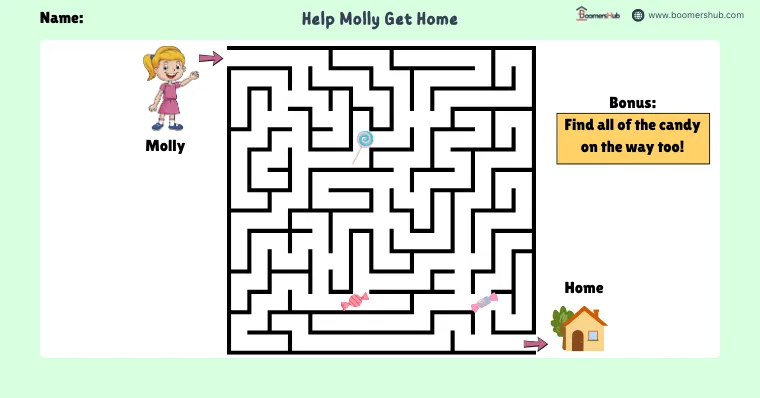
An Activity calendar for seniors with dementia: Have your plan in one place
A common concern caregivers have for their seniors is planning a full day of entertaining activities. Luckily, we’ve come up with a 31-day activity calendar that has 101 things to do with dementia patients.
The calendar offers 3 or 4 activities each day. These activities are easy and fun, so you can accommodate them based on your older adult’s needs and situation. The calendar is not dated, with the days unlabeled so that it can be used for any month of the year.
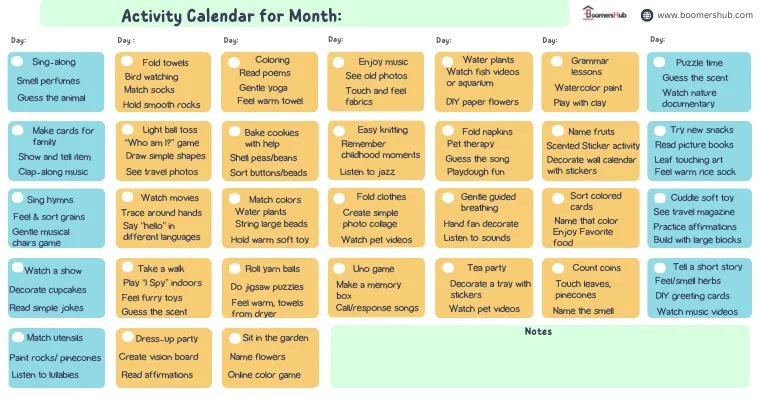
Calming activities for dementia patients
The rule of thumb for calming dementia patients is to engage their senses, such as touch. In this case, the following sensory activities for seniors with Alzheimer’s are recommended:
Physical objects
Items like sand and seashells provide a sense of touch that helps improve the senses in patients.
Personal care
Give the patient a hand massage, or talk a walk, read with them. Even brushing their hair makes for a good activity.
Sensory boost
Things like folding a towel and feeling a textured surface like fur is a great sensory boosters.
Final thoughts
Meaningful activities, ranging from dancing, or gardening, to making a personalized photo frame, can help seniors with dementia nurture their cognitive well-being. This article gave insight into various activities and included a free activity calendar and printable games.
Participating with older adults can help you understand their requirements. It also allows them to reconnect with past experiences and build familiarity. Caring for such seniors requires patience, but it’s a journey that can be enjoyable! Let us know in the comments if you found any of these activities fun or helpful!
FAQs
1. What can you do to help someone with late-stage dementia?
Seniors with dementia prefer repetitive routines and choose activities that provide comfort over achievement or purpose. It’s best to provide them emotional support instead of trying to reason with them so they feel soothed and secure with you.
2. How do you teach dementia patients to use new technology?
Choose a small task and repeatedly follow the same step-by-step instructions with control and simple cues. It’s best to teach them patiently and focus on not overwhelming them.
3. How to handle difficult behaviors in seniors with dementia?
At that moment, it is better not to negotiate or discuss logic. Stay calm and try to focus their attention on a soothing activity such as feeling a smooth texture or deep, calm breathing.
4. How to calm an Alzheimer’s patient down without medication?
Speak softly to them and let your patients settle into a quiet, calm environment. Provide them with reassurance and ask if they would like to listen to gentle music. To lower their anxiety, you can try to direct their focus towards simple activities, such as folding towels or strolling through the garden.

